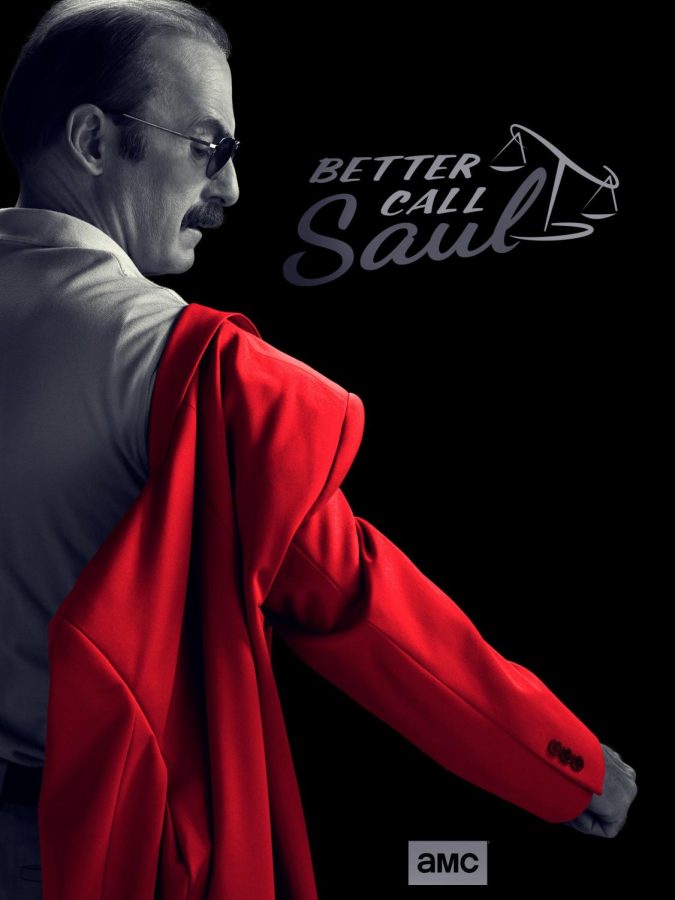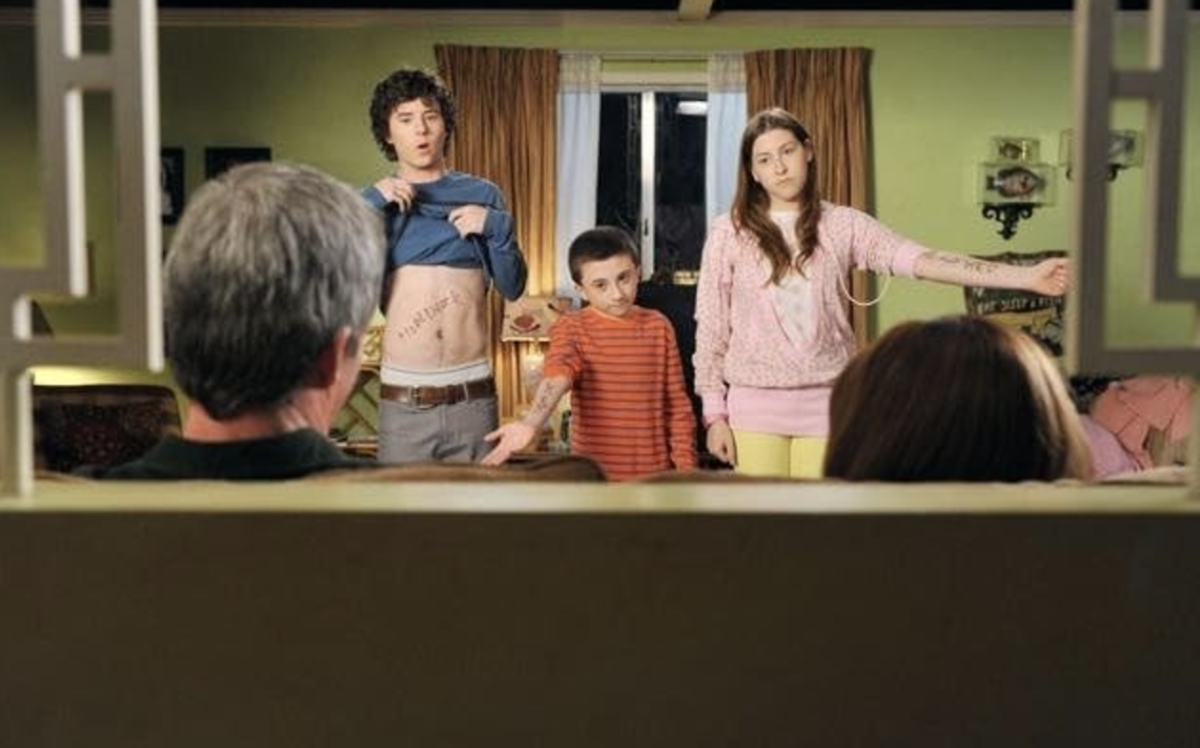Even if you have never seen it, chances are high that you’ve heard of “Breaking Bad.” Since its premiere in 2008, the show has earned a permanent place in television history and pop culture. It’s a whirlwind saga of meth-cooking and bomb-brewing, led by crazy characters certain to take you by surprise. I watched the show for the first time last fall, and if I’m being honest, I was a little disappointed. While I did enjoy watching, and can see why it’s so loved, something was missing. It was hard for me to feel for specific characters, their motivations and actions lacking a certain…heart. Something just wasn’t present on an emotional level. Thankfully, I found this emotion and much more in the show’s prequel, “Better Call Saul.”
“Better Call Saul” follows fan favorite character Saul Goodman, the show’s namesake. In “Breaking Bad,” we see him as a scheming, slimy lawyer who’s prepared to do anything to get a check. He’s crass, he’s animated and he brings a much-needed layer of lightheartedness to “Breaking Bad.” In “Better Call Saul,” however, which takes place six years before the events of “Breaking Bad,” he isn’t Saul Goodman just yet. He’s Jimmy McGill, practicing law under his real name and trying to do things the right way.
“Better Call Saul” is about McGill, played by Bob Odenkirk, and his transition into Goodman over the years. Fans watch the slow, gradual descent into crime, right up until where we meet him in “Breaking Bad.” In the last season, fans are even given a peek into what happens after the fall of Walter White. There’s no question that the show is rich with fan service — featuring Gustavo Fring building his meth empire and other cameos that are sure to satisfy. But the show is rich with something else, too: real emotion.
Unlike “Breaking Bad,” relationships are at the show’s core. They are the bread and butter of Saul’s saga, keeping the viewer invested no matter how many times he screws up. Between all the cartel and crime talk, the show explores dynamics between brothers, friends and even lovers. As we watch in disbelief as McGill, or eventually Goodman, makes horrible decisions, we also watch him struggle to stay good for these people in his life. You end up rooting for McGill, not because of his actions —which are horribly wrong— but because of these relationships. Unlike Walter White, McGill desires to keep his humanity to keep these people in his life, as he’s not really after the power struggle. Being “bad” is in McGill’s nature, but he’s trying desperately to fight it for the people he loves.
The most compelling relationship dynamic in the show is the one between McGill and Kim Wexler, portrayed by Rhea Seahorn. Wexler is portrayed on the surface as the opposite of McGill/Goodman. With a tight, slicked-back ponytail and a can-do attitude, Wexler is working extremely hard to prove that she’s a good lawyer, that she’s smart and that she’s worthy of more. She’s morally perfect, at least on the surface. As her relationship with McGill progresses, it’s revealed she has an addiction to crime and deceit. The audience watches her transformation in tandem with McGill’s, with Wexler often outsmarting McGill with crime. Watching Wexler “break bad” makes McGill’s transformation into Goodman that much worse because the viewer knows it’s mostly his fault.
Kim Wexler, is the driving force behind what makes “Better Call Saul” a cut above “Breaking Bad.” My biggest gripe with “Breaking Bad” is with the female characters. They’re villainized and flat, only in the show to serve other male characters. This isn’t the case with Kim Wexler; Wexler has a direct effect on the main story and main character. Sure, a big part of her storyline on the show has to do with McGill and Goodman, but her only purpose isn’t as his partner. In the show, sometimes he’s reduced to being hers. Wexler is a character with deep, human flaws; this doesn’t make her less of a character, nor does it force her into a single stereotype. I can say with full confidence that she is the best written female character I have ever seen on television. She’s headstrong, emotional, dangerous, smart and in the end, she feels like a real person. That’s all we ask for in representation.
Rhea Seahorn’s performance as Wexler is huge, but not the only reason for the show’s success. Both “Better Call Saul” and “Breaking Bad” utilize a slightly peculiar, artistic style of filmmaking. Shots often focus on one object for multiple beats with no clear reason why. For example, a plastic eye or a melting ice cream. It is up to the viewer to impart meaning on these shots, something I struggled with in “Breaking Bad.” Because I wasn’t emotionally invested in these characters, it was hard to dissect their emotions through these shots. The symbolism was either too obvious, or it fell flat. This isn’t the case in “Better Call Saul.” By the end of the show, shots of the simplest objects like a bottle topper or a ticket booth could make me cry. Taking the time over the seasons to get the audience emotionally invested in the characters pays off immensely in this way.
Throughout its seasons, “Better Call Saul” has earned 46 Emmy nominations. After the Emmys this past weekend, the fact has been solidified: the show won zero. How is it possible that a show this good, this emotional, this suspenseful could take away zero wins after so many nominations? Its predecessor “Breaking Bad” took home 16. And in my opinion, “Better Call Saul” is the more deserving show. There’s a level of emotional maturity “Better Call Saul” brings to the table that gives it that extra edge. By focusing on relationships and by focusing on the character’s individual humanity, the show is more believable and compelling.
Regardless of whether you agree with me or not, “Better Call Saul” has impacted the way fans will see “Breaking Bad” forever. Some will even argue that they shouldn’t even be looked at as separate shows, but rather as one big universe, like the Marvel Cinematic Universe. I can say with full confidence that “Better Call Saul” is one of the best shows I’ve seen in years. It deserved more from the Television Academy, but will forever be a winner in my heart. Give it a chance if you’ve never seen it, especially if you enjoyed “Breaking Bad.” Who knows, you might even end up agreeing that it’s the better show.
Shannon Moore can reached at [email protected].




















